
Guests
- David Donigersenior attorney and strategist at the Natural Resources Defense Council, focused on climate and energy.
- Michael Mannclimate scientist at the University of Pennsylvania, where he is director of the Penn Center for Science, Sustainability and the Media.
The Trump administration is attempting to revoke a landmark rule that allows the Environmental Protection Agency to regulate greenhouse gas emissions from cars, power plants and other sources under the authority of the Clean Air Act. For over a decade, what is known as the “endangerment finding” has been one of the most important legal underpinnings in the federal effort to combat climate change. Since it was instituted, says David Doniger of the Natural Resources Defense Council, “we’ve made a lot of progress” in reducing greenhouse gas emissions. “But now [EPA Administrator Lee] Zeldin is attempting, against the science, to revoke the determination that this stuff is dangerous.” This comes as communities across the United States deal with the effects of increasingly frequent and intense natural disasters, from floods to heat waves to major storms. “What we’re seeing play out, these extreme weather events, are a demonstration that carbon emissions do pose a danger to our health — in fact, to the health of the planet,” says climate scientist Michael Mann.
Transcript
AMY GOODMAN: The Environmental Protection Agency has formally proposed revoking the Obama-era scientific determination that greenhouse gases are a danger to public health and welfare because they cause global warming. The endangerment finding is the basis of a 2009 rule that allows the Environmental Protection Agency to regulate greenhouse gas emissions from cars, power plants and other sources under the authority of the Clean Air Act. It’s been one of the most important legal underpinnings in the federal effort to combat climate change.
EPA chief Lee Zeldin called the move to rescind the finding the, quote, “largest deregulatory action in the history of the United States.” Zeldin spoke on Fox News Tuesday.
LEE ZELDIN: After the endangerment finding came out, not only were there all sorts of mobile source emission standards, but they also came out with trying to regulate out of existence all sorts of stationary sources. They started applying it to airplanes and more. We’re talking about many trillions of dollars. Where does the authority come from? It came from the Obama EPA deciding, very creatively, with a whole bunch of mental leaps, that they were going to just claim an authority, that we believe, after a very plain reading of these Supreme Court cases, we don’t have.
AMY GOODMAN: While EPA chief Zeldin was talking about dismantling climate regulations, Fox News was airing an extreme heat alert warning on the bottom of the screen. The graphic said 162 million Americans were under high heat alerts at the time of that interview.
The EPA relied on a new report from the Department of Energy to justify the proposal. The authors include several scientists well known for their rejection of the scientific consensus on climate change. Meanwhile, the EPA’s own data shows transportation is the sector most responsible for greenhouse gas emissions.
The Sierra Club condemned Zeldin’s move, writing, quote, “As if any doubt remained, the Trump Administration has formalized climate denial as the official policy of the United States government,” unquote.
Democratic Senator Ed Markey spoke at a rally outside the EPA Tuesday.
SEN. ED MARKEY: Listen up, Lee Zeldin. The science is against you. The law is against you. You can try to censor our information. You can try to silence our scientists. You can try to fire hundreds of biologists and chemists and physicists. But you cannot change the science. You cannot change the reality of the harm which is being done by greenhouse gases as they are sent up into the atmosphere. The endangerment finding is backed by the science. It’s backed by the law. It has withstood every attempt to challenge it so far, and it will continue to withstand any challenge which is being made.
AMY GOODMAN: The Texas climate scientist Manuel Salgado of WE ACT for Environmental Justice also spoke outside the EPA. He described last month’s devastating floods that killed over 130 people in Texas.
MANUEL SALGADO: Unfortunately, my hometown and the surrounding communities know quite viscerally what the danger of climate change is. Less than a month ago, on July the Fourth, the area was struck by catastrophic floods. This flooding resulted in an egregious and, frankly, quite preventable loss of life, over 135 people, including 27 children and young people passed away at Camp Mystic. This is all due to supercharged floods from greenhouse gases. …
I cannot imagine how awful it feels to lose a child in a climate disaster, but what I do know is that if Lee Zeldin, Donald Trump and the billionaire polluters that they serve get their way, millions of Americans will know that feeling quite well. We can’t afford that future. We’re going to continue to fight to make sure that the EPA does protect us from the dangers of climate change. Thank you.
AMY GOODMAN: We’re joined now by two guests. David Doniger is senior attorney and strategist with the Natural Resources Defense Council, the NRDC, Climate and Energy Program. Michael Mann is an acclaimed climate scientist and professor at the University of Pennsylvania, also director of the Penn Center for Science, Sustainability and the Media. His forthcoming book with Dr. Peter Hotez is titled Science Under Siege.
Let’s begin with David Doniger. Can you explain what exactly EPA chief Zeldin is doing? Talk about the 2009 endangerment finding and the significance of this moment.
DAVID DONIGER: Thank you. Yes.
I need to start even further back. The first president to ask Congress for legislation that would cover climate change and carbon dioxide was Lyndon Johnson 60 years ago, in 1965. And Congress voted that authority in the 1970 Clean Air Act. So, as the science continued to become stronger and stronger, finally, EPA began to move towards regulating the pollution that drives this climate change. And first, there was a big court case in 2007 called Massachusetts v. EPA, where the Supreme Court ruled that the Clean Air Act definitely does cover the kind of pollution that causes climate change, and that if EPA determined on the science that there was a danger to our health and to our environment, then it had to regulate these chemicals. So, that’s what EPA determined in 2009: Reviewing all the science, there is grave danger to health and to many, many aspects of the environment, and these chemicals need to be regulated.
So, the first step was to establish motor vehicle emission standards. And today’s cars emit one-half as much climate-changing pollution as cars made in 2008. We’ve made a lot of progress. But now Zeldin is attempting, against the science, to revoke the determination this stuff is dangerous, and knock the legs out from under his own legal authority to curb the pollution. He would repeal all of those standards for carbon pollution from vehicles, from power plants and other industries.
AMY GOODMAN: Can you take us through the legal history of regulating greenhouse gases, from the creation of the Clean Air Act to where we are today, David Doniger?
DAVID DONIGER: Right. So, as I said, President Johnson asked for legislation. The Congress passed that legislation in 1970. It specifically says that one of the adverse effects to be prevented was an adverse effect on the weather and on the climate. They knew — they were informed by scientists back then — that carbon dioxide has this heat-trapping property, and it should be treated as a pollutant. Now, it took a long time, but EPA began to move towards regulating at the end of the Clinton administration. When President Bush came in, though, they changed their position pretty much to the one that Zeldin’s taking now: We don’t have the authority. And a bunch of states, led by Massachusetts, and a bunch of environmental groups, including NRDC, sued the EPA. And as I said a moment ago, the Supreme Court ruled that this stuff is actually in the definition of air pollution, and this stuff must be curbed if EPA determines, based on science, that it’s dangerous. So, that’s the legal background.
AMY GOODMAN: I want to bring in Michael Mann. You are a well-known, world-renowned climate scientist, now distinguished professor at University of Pennsylvania. Can you talk about the implications of this? We just heard a clip about what happened in Kerr County in Texas, the more than 130 people who just died there. No one particular weather event, of course, can be attributed to climate change, but the intensity and the frequency of these events, not only in the United States and around the world. Can you talk about what rescinding this so-called endangerment finding will mean globally?
MICHAEL MANN: Yeah. It’s good to be with you, Amy.
And let me first actually add a data point to that timeline that David very nicely provided us. It’s worth noting, at the very beginning of George W. Bush’s first term, in 2000, his own EPA administrator, Republican EPA Administrator Christine Todd Whitman, declared that CO2 is a pollutant that should be regulated under the Clean Air Act. And it was only later, when they got rid of Christine Todd Whitman, that they went down this road that takes us to where we are now. And so, this wasn’t always such a partisan political issue, but today it obviously is.
And, you know, what we’re talking about can be measured in human lives. As you allude to, those floods in Texas, these extreme weather events that we have been enduring here in the United States summer after summer, the heat waves, the wildfires, the floods, the superstorms, the science is very clear here: Human-caused warming has amplified these events. It’s made them more intense, it’s made them more destructive, and it’s made them more deadly. And it’s made them far more unhealthy. And so, this really is a demonstration. What we’re seeing play out, these extreme weather events, are a demonstration that carbon emissions do pose a danger to our health and, in fact, to the health of the planet.
And so, what rescinding the endangerment finding does is take away from the federal government the main lever arm we have, the main tool we have, to reduce carbon emissions and to meet our obligations to the rest of the world under the commitments that we have made. And when the United States fails to lead, it leaves a vacuum, and it leads other nations to sort of ease off in their own efforts. And so, what the United States is doing here, what this administration is doing, is a danger to the entire planet, and it has to be viewed that way.
AMY GOODMAN: Can you talk more about the EPA announcing, Michael Mann, that it’ll eliminate its scientific research arm and begin firing hundreds of chemists, biologists, toxicologists and other scientists, what this means?
MICHAEL MANN: Yeah, no, it’s already been doing that. They’ve already been eliminating large segments of the National Oceanographic and Atmospheric Administration, scientists who study our atmosphere, our oceans, our climate. In every government agency, they’re doing this right now. They’ve actually defunded the Mauna Loa laboratory, the laboratory where we have been measuring CO2 concentrations for half a century, which demonstrate the sort of inexorable increase in carbon dioxide concentrations, the famous Keeling Curve that many of your viewers will have seen.
And so, it’s literally as if they think that if they stop measuring the state of our climate, our atmosphere, our oceans, if they stop measuring it, it will somehow go away. It’s pernicious. It’s dangerous. And, you know, we were a country that was founded on science. The progress that we’ve made, the economy we’ve built, the infrastructure we’ve created, was because we embraced science. And now these latest actions by the administration betray that legacy.
AMY GOODMAN: On Tuesday, the Department of Energy also released a new report that challenges the scientific consensus on the climate impacts of greenhouse gas emissions and provides, quote, “a critical assessment of the conventional narrative on climate change,” unquote. This is Secretary of Energy Chris Wright speaking on Fox News.
ENERGY SECRETARY CHRIS WRIGHT: The goal is to restore confidence in science, in data, in rationalism. That’s what — that’s what enabled the creation of modern science. Then we slid back into sort of a cancel culture, Orwellian squelching of science and talking about the science, as opposed to the process that is science. So, at the Department of Energy, we released a report, which is sort of a critical overview of what do we know today about climate science, about climate data, and what impacts that might have on the American people.
AMY GOODMAN: So, that’s Energy Secretary Chris Wright, standing right next to, in his interview on Fox News, Lee Zeldin. Let’s start with David Doniger responding to this, as he talks about pushing back against the “Orwellian squelching of science.”
DAVID DONIGER: Well, it’s truly an upside-down world when you listen to Chris Wright. He called upon, and actually hired, as special government employees, five people picked because they are climate skeptics and deniers of major elements of the science. These are people who have been advancing fringe views for a long time. And the science community does exactly what Chris Wright wants. It reviews anybody’s assertions against evidence. And these views have been consistently found to be fringe and unreliable and contrary to the evidence. I have not seen anything like this since Tuesday, where scientists are coming out of the woodwork to point out the flaws in this work by the five fringe scientists. There’s a comment period. I’m sure that hundreds of scientists are going to point out the flaws in this work. And for Chris Wright to represent this as an open, neutral process is nonsense. He handpicked five people who have been on the fringe for 20 or 30 years, to tell him what he wants to hear, which is that fossil fuels are the cat’s meow.
AMY GOODMAN: Finally, Michael Mann, your final thoughts, as we go back to the inauguration, when President Trump vowed to declare a national energy emergency in order to fulfill his campaign pledge to “drill, baby, drill.”
MICHAEL MANN: Yeah, it’s, again, you know, the irony — and David laid it out there — this is what we call projection, right? The very things that they are accusing scientists and others of are the things that they are doing. What’s Orwellian here is them claiming they’re doing this for the good of our economy, when, of course, these extreme weather events that have been amplified by climate change are devastating our economy, are devastating agriculture, these wildfires and floods, represent a near and present danger to us. And the cost of inaction, of not preventing further damage, it far outpaces any reasonable estimate of the cost of taking action, of the investment in clean energy that can help create a thriving economy and protect us from the ravages of ongoing climate change.
AMY GOODMAN: I want to thank you both for being with us. Of course, we’ll continue to follow this story. Michael Mann, acclaimed climate scientist, professor at University of Pennsylvania, and David Doniger, senior attorney at NRDC’s Climate and Energy Program. That’s the Natural Resources Defense Council.
Next up, a group of activists from Louisiana have come here to New York to confront the financial backers of natural gas projects in what’s known as “Cancer Alley.” We’ll speak with The Vessel Project’s Roishetta Ozane and her 12-year-old daughter Kamea, who suffers from asthma, like so many in Cancer Alley. Stay with us.
[break]
AMY GOODMAN: “Bad Monsanto” by the late folk musician Michael Hurley in our Democracy Now! studio.

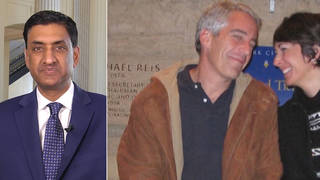
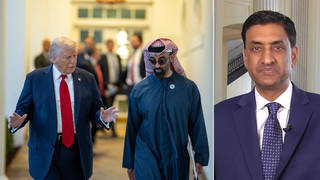
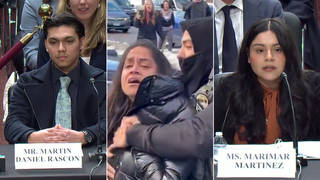
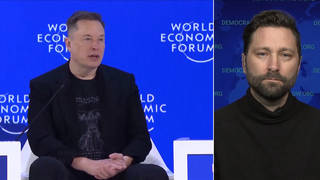







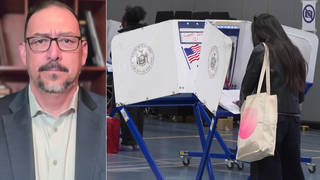
Media Options